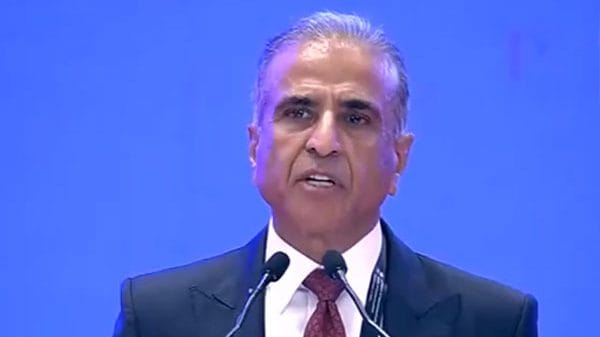The annual telecom pilgrimage in Barcelona — Mobile World Congress — is special this time, as top global voices from the industry are being heard together for the first time in the Trump 2.0 era. The big names range from the chiefs of Telefonica and China Mobile to Telstra, Telenor, and Bharti Airtel. The tone of the summit was set by Marc Murtra, Telefonica chairman and chief executive officer, on the opening day when he stressed the need for technology and telecom consolidation as a route to better returns. Streamed across the world, the keynote video from the Spanish city known for medieval streets, rich architecture, and Barca, echoed Mr Murtra’s words: Time waits for nobody, nor does tech.
When Bharti Airtel Chairman Sunil Bharti Mittal took the stage, he went all out on consolidation and the need for sharing, urging industry, regulators, and governments worldwide to listen in. Mr Mittal’s message to telcos and partnering tech firms was: Share, share, share. The idea is to cut costs through shared tech infrastructure and thereby boost returns.
The biggies in the telecom industry are in sync with the times, knowing well that huge investments in technology — from artificial intelligence to 5G plus platforms — are inevitable. The point that they are making is that their investment burden can come down if they get out of their solo mode and share infrastructure in a challenging environment.
Already, technology is a big piece in the economic reset that each country is looking at in response to US President Donald Trump’s dominance of the world order. Much like during Covid-19 when the global supply chain had broken down without any hope of revival, countries once again look pretty much on their own. Against this setting, tech sovereignty is finding resonance, as Ajai Chowdhry, co-founder of HCL, recently explained at an event organised by this newspaper. Tech sovereignty, or the ability of a country to control its technology, data and digital infrastructure, is being seen as a stepping stone towards “atmanirbharta” in an unpredictable global ecosystem.
However, Mr Mittal, a regular at the Barcelona summit since it started almost a quarter-century ago — and at the GSM World Congress held in multiple venues before that— has approached the idea of tech sovereignty with a twist. When he said, “share, share, share’’ from the podium, he clearly meant pooling of resources to reach the next level of tech excellence and scale. Equally clear was his message that competition should be on brands and services, not on building solo capital infrastructure. Will that align with the idea of tech sovereignty that prevails?
Satellite communication, the spectrum for which has been stuck for years due to a lack of policy clarity in India, found mention in an oblique manner as well. Here, too, the focus was on sharing technology and resources. Mr Mittal spoke about the conflict over spectrum allocation in satcom without directly naming Tesla founder and key Trump ally, Elon Musk. An aspirant for satcom spectrum in the country, Starlink — owned by Mr Musk — has sought administered allocation of spectrum, contrary to the majority industry view favouring an auction-led distribution of airwaves. While the government has stated that India will go with administered allocation of spectrum, following the global practice, the pricing clarity is awaited.
This is no time to fight, Mr Mittal said in his Barcelona keynote, while referring to “the new kid on the block….in the White House’’. The mission to cover the last 400 million people has to be accomplished, he summed up while describing the significance of satellite communication in reaching out to the remotest areas and the last mile.
Even as consolidation, infrastructure sharing, and better returns on investments took centre stage in the biggest telecom summit in the world, a prominent Chinese voice stood out. He Biao, China Mobile president and CEO, made a point that was hard to miss. The translated voice echoed through the hall: “We are makers, takers and shakers of the AI Plus initiative….’’
There was nothing about sharing in Mr He’s address. Clearly, the largest mobile network in China — directly controlled by the People’s Republic of China — sees no need to share resources. That stance is in sharp contrast to the call made by most other telcos, which are pressing their governments and regulators for reduction in taxes and fees from the Barcelona podium. Will they be heard in these extraordinary times of aspirational tech sovereignty?
Nivedita Mookerji @nivmook is the Executive Editor of Business Standard. Views are personal.






